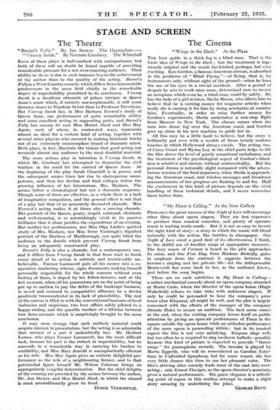STAGE AND SCREEN The Theatre
"Barnet's Folly." By Jan Stewer. The Haymarket "Viceroy Sarah." By Norman Ginsbury. The Whitehall Elicit of these plays is hall-marked with unimportance, but both of them will no doubt be found capable of providing considerable pleasure for a not over-exacting audience. Their ability to do so is due in each instance less to the achievement of the author than to the quality of the acting. Barnet's Folly is a West-Country comedy which differs from innumerable predecessors in the same field chiefly in the remarkable degree of improbability permitted to its conclusion. Viceroy Sarah is a desultory chronicle of palace intrigue in Queen Anne's court which, if entirely unexceptionable, is still some distance closer to Wardour Street than to Professor Trevelyan. But Viceroy Sarah has, in Miss Barbara Everest's study of Queen Anne, one performance of quite remarkable ability and some excellent acting in supporting parts, and Barnet's Folly has among its cast Miss Muriel Aked and Miss May Agate, each of whom, in contrasted ways, represents almost an ideal for a certain kind of acting, together with several other players who succeed in making histrionic bricks out of an extremely commonplace brand of dramatic straw. Both plays, in fact, illustrate the truism that good acting can reconcile almost any audience to the most doubtful material.
The more serious play in intention is Viceroy Sarah, in which Mr. Ginsbury has attempted to dramatize the civil warfare in the court for the control of Queen Anne. At the beginning of the play Sarah Churchill is in power, and the subsequent scenes trace her rise to obstreperous omni- potence, and then her decline and final collapse before the growing influence of her kinswoman, Mrs. Masham. The scenes follow a chronological but not a dramatic sequence. Though some of them are effective, as a whole there is a lack of imaginative compulsion, and the general effect is not that of a play but that of an accurately decorated charade. Miss Everest's acting makes it at times also a moving charade. Her portrait of the Queen, gouty, stupid, rubicund, obstinate and well-meaning, is so astonishingly vivid in its passive brilliance that it alone justifies the expenditure of an evening. But neither her performance, nor Miss Olga Lindo's spirited study of Mrs. Masham, nor Miss Irene Vanbrugh's dignified portrait of the Duchess of Marlborough, can quite blind the audience to the details which prevent Viceroy Sarah from being an adequately constructed play.
• Barners Folly is also a charade, but a contemporary one, and it differs from Viceroy Sarah in that from start to finish every detail of its action is entirely and irretrievably un- believable. Farmer Lannacott puts all his money into a co- operative marketing scheme, signs documents making himself personally responsible for the whole concern without even looking at them, is duped by his fellow-farmers, and at the last moment, when all his possessions are on the point of being put up to auction to pay the debts of the bankrupt business, is saved and restored to comparative affluence by a device positively transcendental in its lack of plausibility. The rest of the canvas is filled in with the conventional humours of local -jealousies and suspicions, two love affairs safely piloted to a happy ending, and the guerilla warfare of a lifetime between two farm-servants which is surprisingly brought to the same conclusion.
It may seem strange that such unlikely material could acquire interest in presentation, but the acting is so admirable that interest of a sort it undoubtedly has. Mr. Herbert Lomas, who plays Farmer Larmaeott, has the most difficult task, because his part is the richest in improbability, but he succeeds in a remarkable way in carrying his burden to credibility, and Miss Mary Jerrold is unemphatically efficient as his wife. Miss May Agate gives an entirely delightful per- formance as the wife of a neighbouring farmer, and to that patriarchal figure himself Mr. Wilson Coleman brings an appropriately vengeful determination. But the chief delights of the evening are provided by the scenes between the author, Mr. Jan Stewer, and Miss Muriel Aked, in which the absurd is most unconditionally given its head.
DERY-1{ VERSCLIOYLE.


















































 Previous page
Previous page